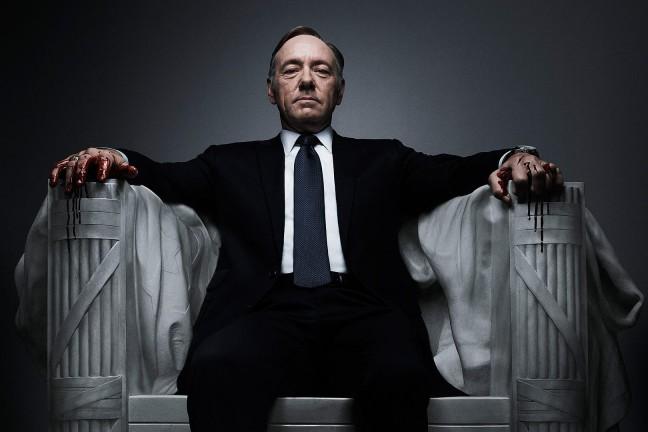Note: I’ve attempted to make this review as spoiler-free as humanly possible. That said, this was really difficult. So if you haven’t watched the first episode of season two (at the very least) this is your formal warning that potential spoilers lie ahead.
In its second go-around, “House of Cards” starts off with a rail-shaking bang. The scene, which involves the bloody elimination of a main character, serves as a pertinent reminder that Frank Underwood isn’t taking any chances in his quest to consolidate his political power.
Unfortunately, that gut-wrenching episode (which left me literally shrieking in shock) contains the biggest revelation of the entire season, so it’s pretty downhill from there on out. Kevin Spacey is again impeccable as Frank, a political creature so adept at navigating Washington’s well-oiled corruption machine that we wait with baited breath for him to fall from grace, all while watching him evade a justified demise time and time again.
Without season one’s lynchpin and (generally) sympathetic protagonist, it’s hard to feel invested in Frank’s scheming. This season is mostly devoid of the charged, personality-driven drama that made the show addictive and innovative from the onset. We’re left chasing shifting political plots—a trade war with China! Money laundering to PACs! Journalists hot on the trail of cyberterrorists!—that will likely beguile “West Wing” fans. While the first season was neatly packed, season two is a far more sweeping affair. But I didn’t feel invested enough in the political drama to tune into the particulars, which made the season lag a bit between the opening episode and the threesome (another highlight of the season).
Even so, the show managed to keep me watching episode after episode, in the formulaic exploitation of human inertia that allowed Netflix to build a streaming empire. “House of Cards” manages to plant just enough seeds to keep the show vaguely interesting, even when it’s hopelessly mired in political in-fighting and little more.
The show also suffers from the opposite affliction. There are so many story threads ebbing, flowing and then never heard from again that it’s hard to get too attached to any in particular. By being about almost nothing and everything at the same time, the show still manages to hit its mark: getting you to binge-watch the entire thing without coming up for air. (I managed to finish the series in two days, which is not an achievement worth bragging about.) As Todd VanDerWerff over at the A.V. Club points out, the show maintains just enough nondescript symbolism and political intrigue to make it seem like there’s something bigger at play, even when that’s clearly not the case.
The show also labors under the weight of its own bloated expectations. Showrunner Beau Willimon and director David Fincher couldn’t drill the notion that Frank is going full Machiavelli into viewers’ consciousness any more if he bludgeoned us over the heads with a 2-by-4 piece of cedar. The show’s loud arrival on the D.C. scene is also clearly evident this time around. After President Barack Obama and other members of the political elite engaged with the show, it makes sense that names like Rachel Maddow, “60 Minutes”‘ Morley Safer and other prominent reporters are featured for an added air of authenticity.
The most interesting character development to trace this season is Claire’s deepening humanity. Robin Wright’s character is at once coldly calculating and resolute, the perfect complement to Frank, but she reveals herself to be far closer to human than we glimpse in season one. It’s immensely satisfying, then, to watch Claire break down in tears after an unnerving experience with a mentally unstable sexual assault victim who’s wised up to the Underwoods’ political games. In her well-coiffed collapse, she’s fragile and almost vulnerable before picking herself up and dusting off her always-banging structured dress. But that hardly means Claire has gone soft: She also tells a pregnant business former partner-turned-legal threat that she’s willing “to let [her] child wither and die inside of [her] if that’s what’s required.”
Another seminal moment comes when Claire reveals in a live national television interview that she’s had not one but three abortions during the time she’s been married to Frank. It’s a watershed moment not just for the character but for the show’s trajectory. But even though her candidness about her rape by a now-prominent military official kicks off a well-meaning legislative battle, the interaction leaves a bad taste in your mouth. She used the platform she given to further a critical issue for women, but only divulged the facts to create a diversion in the interview, which was quickly escalating into possibly damaging territory for the Underwoods. The move feels calculated. Even so, her contention that children weren’t a part of her vision for the future is refreshing, and it’s hard not to respect her strength and honesty.
With the widespread frenzy that surrounded the Valentine’s Day release of “House of Cards,” we’re likely to see the fever pitch surrounding the series continue to grow. The believable outlandishness of scheming politicians still makes for a satisfying watch, even if you’re not genuinely rooting for a single character.
Frank says early on that there are two kinds of vice presidents: matadors and doormats. It’s always been clear which one Frank is, and it’s entertaining to watch him resolutely stare down the bull time and time again, only to emerge from the arena without so much as a scratch.








